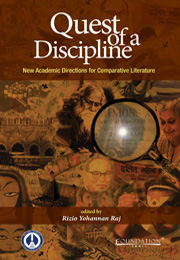Book contents
- Frontmatter
- Contents
- List of Contributors
- Acknowledgements
- Prologue to the “Quest'
- Introduction
- PART I Traditions and Manifestoes: Reflecting on Perspectives
- PART II The Quest Motif: Redefining the Scope of Comparative Literature
- PART III The Dynamics of Exchange: Genres, Areas and Disciplines
- PART IV India: A Curious Comparative Space
- 15 Towards a Compoetics in India: Alternative Frameworks for the Comparative Study of Poetics
- 16 The Relevance of Dalit Studies in the Creation of an Interdiscipline
- 17 Mother Tongue, The Other Tongue: Indianising English
- Afterword: Comparative? Literature?
- Index
15 - Towards a Compoetics in India: Alternative Frameworks for the Comparative Study of Poetics
from PART IV - India: A Curious Comparative Space
Published online by Cambridge University Press: 05 June 2012
- Frontmatter
- Contents
- List of Contributors
- Acknowledgements
- Prologue to the “Quest'
- Introduction
- PART I Traditions and Manifestoes: Reflecting on Perspectives
- PART II The Quest Motif: Redefining the Scope of Comparative Literature
- PART III The Dynamics of Exchange: Genres, Areas and Disciplines
- PART IV India: A Curious Comparative Space
- 15 Towards a Compoetics in India: Alternative Frameworks for the Comparative Study of Poetics
- 16 The Relevance of Dalit Studies in the Creation of an Interdiscipline
- 17 Mother Tongue, The Other Tongue: Indianising English
- Afterword: Comparative? Literature?
- Index
Summary
INTRODUCTION
India, in its long and attested intellectual tradition, has contributed to different domains of knowledge. In the process of doing so, the Indian thinkers have sounded caveats against insulation of knowledge systems and traditions. Sushruta, for instance, in Sushruta Samhita, a text pertaining to the science of life, not merely medicine, stated, Ek shastram adhiyano na vidhya shashtra nishchayam. (Do not arrive at any conclusion by studying just one discipline.) (Sushruta Samhita, Sutra Sthan, Prabhashniya Adhyaya, Chapter IV, Shloka 7) Bhartrihari, a grammarian and philosopher king of Ujjayini, in the Vakyapadiya 2.484, emphasized the importance of knowing one's own as well as the alien traditions: ‘The intellect acquires critical acumen by familiarity with different traditions. How much does one really understand by merely following one's own reasoning only?’ Statements such as the preceding ones supporting the diversity and multiplicity of systems and traditions and the necessity to accept and understand it abound in all major Indian texts and traditions. The statement may, thus, be read: What does s/he know who does not know his/her tradition, and what does s/he know who knows only his/her own tradition?
With its rich history of co-existence marked by inclusiveness and tolerance, India emerges as one of the most suitable sites for comparative study of literature in general and poetics in particular. The other side of this argument is that with a large number of lived belief systems and speculative thoughts, India has lived its diversities for so long and naturally, they have become part of its psychic and cultural systems, which has resulted in its not seriously considering the creation of a methodology for Comparative Studies.
- Type
- Chapter
- Information
- Quest of a DisciplineNew Academic Directions for Comparative Literature, pp. 225 - 246Publisher: Foundation BooksPrint publication year: 2012

